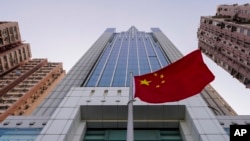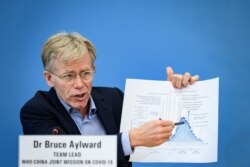The Hong Kong government has criticized a public broadcaster for "breaching the One-China principle" after a reporter asked a World Health Organization official about Taiwan's eligibility to join the international body amid the coronavirus pandemic.
The public dressing down came amid continued criticism of the WHO for excluding Taiwan from its membership under pressure from Beijing, which insists that Taiwan must be considered part of China under its "One-China principle."
The government's reprimand of RTHK also has stoked widespread concern over the public broadcaster's editorial independence and the wider implications for Hong Kong's press freedom.
In a current affairs program, "The Pulse", last Friday, RTHK's reporter Yvonne Tong asked Bruce Aylward, a senior adviser at the WHO, in a video call whether the organization would allow Taiwan to join amid the COVID-19 crisis. Aylward, a Canadian physician and epidemiologist, in February led a WHO mission to China's Wuhan, the epicenter of the outbreak.
After more than 10 seconds of silence, Aylward said he could not hear her question, and when Tong offered to repeat the question, he told her to "move to another one." When Tong insisted on asking about Taiwan, the call became disconnected. When the line was reconnected, she asked if he could comment on how Taiwan had done in combating the virus, to which Aylward replied, "We've already talked about China." The exchange went viral on social media.
In a clear sign the broadcaster has embarrassed the Hong Kong government, the secretary for commerce and economic development, Edward Yau, accused RTHK of breaching its charter obligations, which include "engendering a sense of national identity" and "promoting understanding of the concept of 'One Country, Two Systems'."
"The Secretary holds the view the presentation in that episode of the aforesaid program has breached the One-China Principle," a government press release said.
"It is common knowledge that the WHO membership is based on sovereign states. RTHK, as a government department and a public service broadcaster, should have proper understanding of the above without any deviation," it reads.
The publicly-funded RTHK has long been accused by the pro-China camp of failing to toe the official line in its reporting on political issues, particularly during the anti-government protests that started last June, which it saw as overly sympathetic toward the protesters.
Pro-Beijing lawmaker Junius Ho, a vociferous critic of the public broadcaster, charged that Tong's questions were "dangerous."
Responding to the government's allegation, RTHK noted the program looked at various responses across the world to the coronavirus, with Taiwan being the focus of just part of the program. It said it did not refer to the island as a "country," but rather as a "place."
"RTHK reviewed the content of the episode and found that it did not violate the 'One Country, Two Systems' principle, nor did it violate the RTHK Charter," according to a spokeswoman.
The government's criticism drew the ire of the wider community. Many online petitions were circulating Friday demanding the Hong Kong government stop its editorial interference on RTHK.
Fermi Wong, a member of RTHK's program advisory panel, said she suspected the government had acted under pressure from Beijing. "I don't really understand why, when a reporter is asking something relating to health, she or he has to remember there is 'One Country, Two Systems' … in line with the government or China," she said.
The chairman of the Hong Kong Journalists Association, Chris Yeung, said the government statement aimed at putting pressure on RTHK, which could lead to self-censorship.
"That will cast a long shadow on journalists for them to think twice when they ask similar questions next time because that could cross what officials deem a political red line," he told RTHK.






